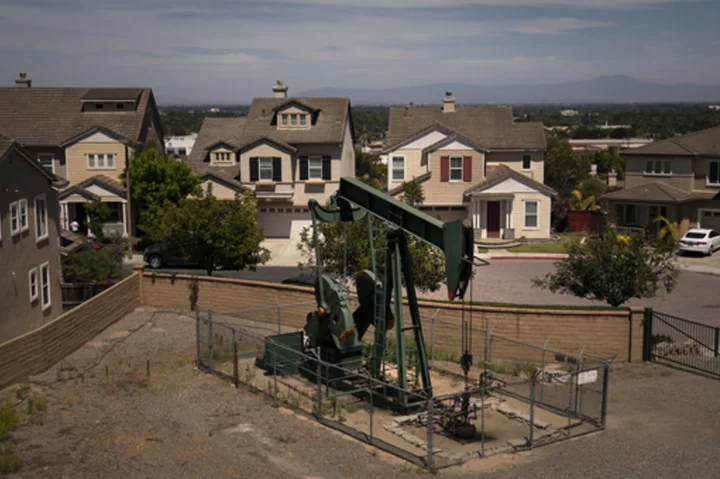SACRAMENTO, Calif. (AP) — California voters may be asked twice on the same November 2024 ballot whether to keep or to ditch a law mandating new oil wells be a certain distance away from homes, schools and parks.
Recently, state lawmakers have been debating whether to reform the referendum process that makes overturning a law possible, as it has been leveraged by powerful industries to invalidate laws that are unfavorable to them.
Last year, lawmakers approved so-called buffer zones around oil wells, which dot communities around Los Angeles and the state's Central Valley, as part of a package of bills aimed at tackling climate change and pollution. The oil industry quickly moved to undo the law by gaining a spot on the 2024 ballot.
But on Wednesday environmental advocates put forward their own proposed ballot measure aimed at getting voters to require buffer zones.
“People who live next to oil wells get very, very sick. Californians who live next to this stuff, they have headaches, nosebleeds, nausea," said Kassie Siegel, director of the nonprofit Center for Biological Diversity’s Climate Law Institute. "You do not want the oil company moving in next door.”
The possibility of dueling ballot measures on new oil wells also showcases the growing political tension around California's approach to dealing with climate change, with Gov. Gavin Newsom's administration increasingly passing laws aimed at shrinking the oil and gas industry. Two measures on the same ballot could confuse voters, threatening both sides' chances of success.
Outside California, nearly half of U.S. states have a process allowing voters to reject policies that state legislators have passed.
Environmental justice groups have made multiple attempts over the years to establish a minimum distance between oil and gas wells near places like homes and schools. Newsom signed the law last year that banned new gas and oil wells within 3,200 feet (975 meters) of sensitive areas.
A lawyer for the California Independent Petroleum Association quickly filed for the referendum to ask voters to overturn the law, and the group collected enough signatures earlier this year to put it on the ballot. Rock Zierman, the group’s CEO, said keeping the law would burden oil companies in California at a time when they already have to follow what he called some of the strictest environmental and labor laws in the world.
The Legislature is weighing whether to change the referendum process, so Californians don't get confused about whether they're voting to uphold or to overturn a law. The legislation would have voters decide to either “keep the law” or to “overturn the law.” That would mean a departure from a “yes” vote to keep the law or a “no” vote to overturn it.
The oil industry's tactics to collect the 623,000 signatures needed to get their favored measure on the ballot has come under fire. The California Secretary of State's office said last year it was investigating complaints alleging signature gatherers were spreading misinformation about the measure.
Over the decades, Californians have been asked to vote more than once on the same issue, on measures about car insurance rates and campaign financing, among other hot-button topics.
Ballot measures in California typically need support from more than 50% of the vote to pass. If there are two conflicting measures that meet that threshold, the one that got the most votes would prevail, said Bob Stern, former president of the nonprofit Center for Governmental Studies. But Stern said he's never heard of a referendum and a competing measure appearing on the same ballot in California.
“When there are a lot of measures on the ballot, voters tend to vote no,” he said.
Voters also tend to vote “no” if they are confused about a referendum or initiative, Stern said. That can be a good thing for proponents of a referendum who want to garner enough “no” votes to overturn a law.
Advocates who want to keep the buffer zone law say it aligns with the state’s broader climate goals and will help protect residents from pollution-related health risks.
Mike Young, a political director with California Environmental Voters, said the law should have been passed a long time ago.
He asked, “What does that say about us that we're not willing to protect our most vulnerable communities?”
___
Sophie Austin is a corps member for the Associated Press/Report for America Statehouse News Initiative. Report for America is a nonprofit national service program that places journalists in local newsrooms to report on undercovered issues. Follow Austin on Twitter: @sophieadanna.

